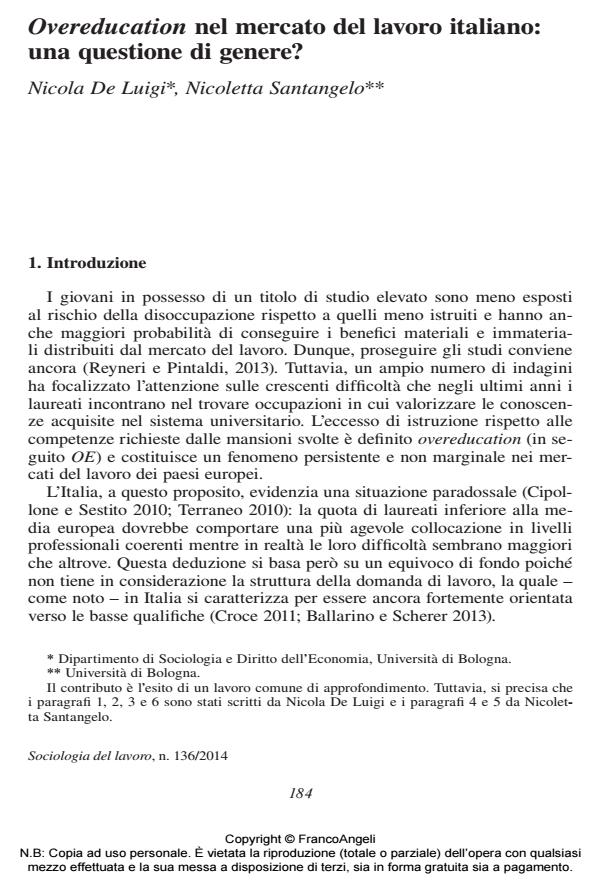Overeducation in the Italian labour market: a gender issue?
Journal title SOCIOLOGIA DEL LAVORO
Author/s Nicola De Luigi, Federica Santangelo
Publishing Year 2014 Issue 2014/136
Language Italian Pages 19 P. 184-202 File size 173 KB
DOI 10.3280/SL2014-136010
DOI is like a bar code for intellectual property: to have more infomation
click here
Below, you can see the article first page
If you want to buy this article in PDF format, you can do it, following the instructions to buy download credits

FrancoAngeli is member of Publishers International Linking Association, Inc (PILA), a not-for-profit association which run the CrossRef service enabling links to and from online scholarly content.
Overeducation (OE) is a controversial issue, both in terms of conceptualization and measurement. Sseveral studies highlight that its share is increasing among young graduates. The field of study seems to play a significant role in order to assess the risk of OE. Technical-scientific fields perform better than the humanistic- social ones and this hierarchy parallels the gender distribution among academic disciplines. The paper aims at verifying, among a sample of Italian graduates interviewed in 2007, 3 years after graduation, whether and to what extent the influence of the field of study on the probability to experience a condition of OE 3 years after graduation may be different for males and females. Secondly, it intends to test the hypothesis that academic performance and postgraduation training could modify the "field effect".
Keywords: Higher education graduates, gender, over-education, fields of study, educational performance, transition to work
- Argentin G. (2010). University pathways and graduate labour market outcomes in Italy: What Matters Where? Italian Journal of Sociology of Education, 2: 107-147.
- Ballarino G., Bratti M. (2009). Field of Study and University Graduates’ Early Employment Outcomes in Italy during 1995-2004. Labour: Review of Labour Economics and Industrial Relations, 23(3): 421-457. DOI: 10.1111/j.1467
- 9914.2009.00459.x. Ballarino G., Scherer S. (2013). More investment-less returns. Changing returns to education in Italy across three decades. Stato e mercato, 3: 359-386. DOI: 10.1425/75010
- Barone C. (2010). La segregazione di genere all’università: il caso italiano in una prospettiva comparativa e diacronica. Stato e mercato, 89: 287-320. DOI: 10.1425/32737
- Bartus T. (2005). Estimation of Marginal Effects Using Margeff. Stata Journal, 5, 309-329.
- Bernardi F. (2003). Returns to Educational Performance at Entry into the Italian Labour Market. European Sociological Review, 19: 25-40. DOI: 10.1093/esr/19.1.25
- Bobbitt-Zeher S. (2007). The Gender Income Gap and the Role of Education. Sociology of Education, 80, 1-22.
- Burris V. (1983). The Social and Political Consequences of Overeducation. American Sociological Review, 48: 454-467.
- Chevalier A. (2003). Measuring Overeducation. Economica, 70: 509-531.
- Cipollone P., Sestito P. (2010), Il capitale umano. Come far fruttare i talenti. Bologna: il Mulino.
- Croce G. (2011). L’overeducation in Europa e in Italia. Dobbiamo prenderla sul serio? Meridiana, 71-72: 75-100.
- Croce G., Ghignoni E. (2011). Overeducation and spatial flexibility in Italian local labour markets. Dipartimento di Economia Pubblica - Università di Roma La Sapienza, Working Paper n. 145.
- Dolton P., Silles M. (2001). Over education in the graduate labour market: some evidence from alumni data. CEEDP, 9. Centre for the Economics of Education, London School of Economics and Political Science, London, UK.
- Dolton P., Vignoles A. (2000). The Incidence and Wage Effects of Overeducation in the UK Graduate Labour Market. Economics of Education Review, 19: 179-198.
- Frank R. (1978). Why women earn less: the theory and estimation of differential overqualification. American Economic Review, 68(3): 360-373.
- Freeman R. (1976). The overeducated American. New York: Academic Press.
- Hartog J. (2000). Over-education and earnings: Where are we, where should we go? Economics of Education Review, 19(2): 131-147.
- Klein M. (2010). Mechanisms for the Effect of Field of Study on the Transition from Higher Education to Work. MZES Working Papers n. 130.
- Kucel A., Noelke C., Reimer D. (2008). Labor Market Effects of Field of Study in Comparative Perspective. International Journal of Comparative Sociology, 49: 233-256.
- McGuinness S. (2006). Overeducation in the Labour Market. Journal of Economic Surveys, 20: 387-418. DOI: 10.1111/j.0950-0804.2006.00284.x
- Mood C. (2009). Logistic Regression: Why We Cannot Do What We Think We Can Do, and What We Can Do About It. European Sociological Review, 26: 67-82. DOI: 10.1093/esr/jcp006
- Ortiz L., Kucel A. (2008). Over-education and field of study in Spain. International Journal of Comparative Sociology, 49(4-5): 305-327.
- Reyneri E. (2011). Sociologia del mercato del lavoro. Vol. 1. Bologna: il Mulino. Reyneri E., Pintaldi F. (2013). Dieci domande su un mercato del lavoro in crisi. Bologna: il Mulino.
- Schivardi F., Torrini R. (2011). Cambiamenti strutturali e capitale umano nel sistema produttivo italiano. Questioni di economia e finanzia, 108, Banca d’Italia.
- Terraneo M. (2010). Istruzione e lavoro: la condizione dei neolaureati italiani. Stato e mercato, 3: 425-470. DOI: 10.1425/3314
- Fostering employment match? Graduates’ internships and early professional experiences between individuals’ choices and institutional constraints Sara Romanò, Tiziana Nazio, in International Journal of Sociology and Social Policy /2025 pp.394
DOI: 10.1108/IJSSP-10-2024-0498 - Institutions and Impersonal Exchange: The European Experience Avner Greif, in SSRN Electronic Journal /2004
DOI: 10.2139/ssrn.548783
Nicola De Luigi, Federica Santangelo, Overeducation nel mercato del lavoro italiano: una questione di genere? in "SOCIOLOGIA DEL LAVORO " 136/2014, pp 184-202, DOI: 10.3280/SL2014-136010